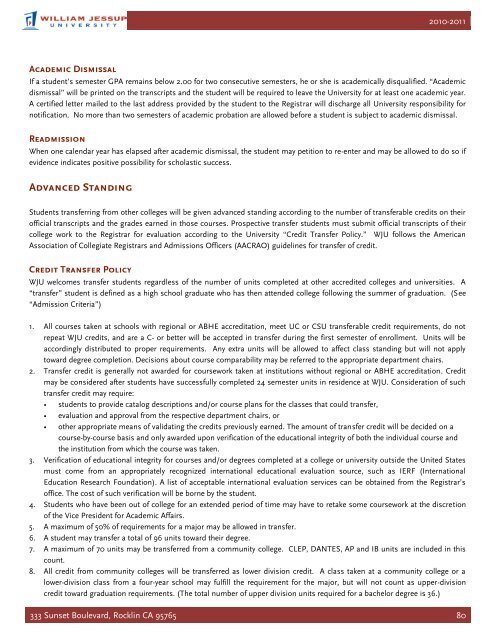School of Professional Studies - William Jessup University
School of Professional Studies - William Jessup University
School of Professional Studies - William Jessup University
Create successful ePaper yourself
Turn your PDF publications into a flip-book with our unique Google optimized e-Paper software.
2010-2011<br />
Academic Dismissal<br />
If a student’s semester GPA remains below 2.00 for two consecutive semesters, he or she is academically disqualified. “Academic<br />
dismissal” will be printed on the transcripts and the student will be required to leave the <strong>University</strong> for at least one academic year.<br />
A certified letter mailed to the last address provided by the student to the Registrar will discharge all <strong>University</strong> responsibility for<br />
notification. No more than two semesters <strong>of</strong> academic probation are allowed before a student is subject to academic dismissal.<br />
Readmission<br />
When one calendar year has elapsed after academic dismissal, the student may petition to re-enter and may be allowed to do so if<br />
evidence indicates positive possibility for scholastic success.<br />
Advanced Standing<br />
Students transferring from other colleges will be given advanced standing according to the number <strong>of</strong> transferable credits on their<br />
<strong>of</strong>ficial transcripts and the grades earned in those courses. Prospective transfer students must submit <strong>of</strong>ficial transcripts <strong>of</strong> their<br />
college work to the Registrar for evaluation according to the <strong>University</strong> “Credit Transfer Policy.” WJU follows the American<br />
Association <strong>of</strong> Collegiate Registrars and Admissions Officers (AACRAO) guidelines for transfer <strong>of</strong> credit.<br />
Credit Transfer Policy<br />
WJU welcomes transfer students regardless <strong>of</strong> the number <strong>of</strong> units completed at other accredited colleges and universities. A<br />
“transfer” student is defined as a high school graduate who has then attended college following the summer <strong>of</strong> graduation. (See<br />
“Admission Criteria”)<br />
1. All courses taken at schools with regional or ABHE accreditation, meet UC or CSU transferable credit requirements, do not<br />
repeat WJU credits, and are a C- or better will be accepted in transfer during the first semester <strong>of</strong> enrollment. Units will be<br />
accordingly distributed to proper requirements. Any extra units will be allowed to affect class standing but will not apply<br />
toward degree completion. Decisions about course comparability may be referred to the appropriate department chairs.<br />
2. Transfer credit is generally not awarded for coursework taken at institutions without regional or ABHE accreditation. Credit<br />
may be considered after students have successfully completed 24 semester units in residence at WJU. Consideration <strong>of</strong> such<br />
transfer credit may require:<br />
• students to provide catalog descriptions and/or course plans for the classes that could transfer,<br />
• evaluation and approval from the respective department chairs, or<br />
• other appropriate means <strong>of</strong> validating the credits previously earned. The amount <strong>of</strong> transfer credit will be decided on a<br />
course-by-course basis and only awarded upon verification <strong>of</strong> the educational integrity <strong>of</strong> both the individual course and<br />
the institution from which the course was taken.<br />
3. Verification <strong>of</strong> educational integrity for courses and/or degrees completed at a college or university outside the United States<br />
must come from an appropriately recognized international educational evaluation source, such as IERF (International<br />
Education Research Foundation). A list <strong>of</strong> acceptable international evaluation services can be obtained from the Registrar’s<br />
<strong>of</strong>fice. The cost <strong>of</strong> such verification will be borne by the student.<br />
4. Students who have been out <strong>of</strong> college for an extended period <strong>of</strong> time may have to retake some coursework at the discretion<br />
<strong>of</strong> the Vice President for Academic Affairs.<br />
5. A maximum <strong>of</strong> 50% <strong>of</strong> requirements for a major may be allowed in transfer.<br />
6. A student may transfer a total <strong>of</strong> 96 units toward their degree.<br />
7. A maximum <strong>of</strong> 70 units may be transferred from a community college. CLEP, DANTES, AP and IB units are included in this<br />
count.<br />
8. All credit from community colleges will be transferred as lower division credit. A class taken at a community college or a<br />
lower-division class from a four-year school may fulfill the requirement for the major, but will not count as upper-division<br />
credit toward graduation requirements. (The total number <strong>of</strong> upper division units required for a bachelor degree is 36.)<br />
333 Sunset Boulevard, Rocklin CA 95765 80


